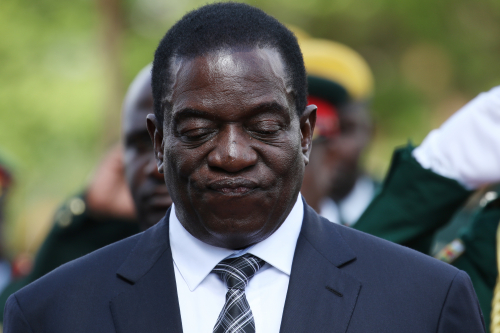
BY RICHARD MUPONDE/EVERSON MUSHAVA
UNITED States senators have proposed to add more Zimbabweans on the sanctions list, a move likely to pile misery on embattled President Emmerson Mnangagwa (pictured)’s government desperate to re-engage with the West to shore up its free-falling economy.
Just when Zimbabwe had roped in the whole of Sadc and the African Union to amplify its calls for the removal of sanctions imposed in 2001, the US has upped the ante by insisting on further tightening the restrictive measures until Zimbabwe makes the necessary political reforms and stop human rights abuses.
Senators Jim Risch, chairman of the Senate Foreign Relations Committee, and Chris Coons, a member of the Subcommittee on Africa and Global Health Policy, on Wednesday wrote to Treasury secretary Steven Mnuchin and Secretary of State Mike Pompeo requesting that the US Department of the Treasury update the list of sanctioned people in Zimbabwe.
“While the United States has been the top provider of humanitarian and development aid to meet the needs of Zimbabwe’s people, the government of Zimbabwe has implemented a misinformation campaign blaming the country’s woes on targeted sanctions programmes implemented by the United States,” the senators said in the letter dated January 29.
“It is important that the United States communicates to the people of Zimbabwe that our sanctions programmes are aimed at deterring human rights abuses, public corruption, the undermining of democratic processes or institutions, and political repression in Zimbabwe. They are not aimed at the Zimbabwean people.”
Mnangagwa’s government, like his predecessor the late Robert Mugabe, have blamed the US on the country’s economic crisis through its sanctions imposed under the Zimbabwe Economic Recovery Act (Zidera) of 2001.
Zidera came as a response to Mugabe’s chaotic and violent land reform programme of 2000 and a series of violent elections marred by gross human rights abuses.
- Chamisa under fire over US$120K donation
- Mavhunga puts DeMbare into Chibuku quarterfinals
- Pension funds bet on Cabora Bassa oilfields
- Councils defy govt fire tender directive
Keep Reading
Mugabe, blaming the sanctions for the economic meltdown, in May 2016 addressed a one-million-man march against the sanctions.
His successor, Mnangagwa, last year on October 25 addressed a Sadc solidarity march against the embargoes, blaming the sanctions for the deteriorating economic situation.
Apart from roping in Sadc and the whole of Africa, Mnangagwa has hired three public relations consultants, two of them American and another one from London to try to spruce up the administration’s image and bring back Zimbabwe into the community of nations after years of international isolation.
But State-sanctioned human rights abuses back home have militated against his global charm offensive.
US ambassador to Zimbabwe, Brian Nichols has been challenging Mnangagwa administration’s narrative that sanctions were hurting the economy. He said corruption and bad governance, not sanctions, were the reason the country’s economy was spectacularly collapsing.
Foreign Affairs minister Sibusiso Moyo recently censured the US envoy, but the superpower has insisted on reforms for the sanctions to be lifted.
On Monday, US ambassador to Botswana, Craig Cloud, met Sadc executive secretary Stergomena Lawrence Tax and claimed he clarified that the sanctions on Zimbabwe were imposed because of the anti-democratic practices by the country and human rights abuses.
The fresh calls by the US senators are likely to see the superpower update the sanctions list to include more Zanu PF bigwigs, a worrying development for Mnangagwa who has been desperate to engage with the West in order to get lines of credit to resuscitate the collapsing economy, which has become the biggest threat to his two-year rule.
The senators said they were irked by the government of Zimbabwe’s misinformation to the world that problems devilling the country were as a result of sanctions imposed by the US and not because of abuse of human rights, corruption and bad governance.
They said while the targeted sanctions have been in place, the US has continued to invest in humanitarian and development aid for Zimbabwe, channelling more than $2 billion over the last 10 years.
“Given the developments in Zimbabwe over the last two years, we urge you to consider enhancing the tools at your disposal, including the use of targeted sanctions, to incentivise changes in behaviour by the government of Zimbabwe,” the senators added.
“An update to the list of the Specially Designated Nationals and Blocked Persons list should incorporate a balance of new designations with appropriate removals.”











